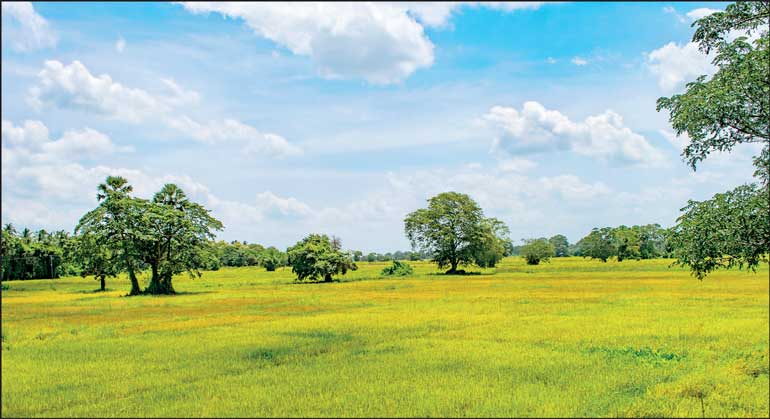Friday Feb 20, 2026
Friday Feb 20, 2026
Friday, 21 January 2022 00:00 - - {{hitsCtrl.values.hits}}

Sri Lanka has a long tradition of public insurance in the agriculture sector
 The impacts of climate change can be felt around the world, ranging from extreme weather events to sea level rise and shifting seasons. Climate-related risks are now a reality for all economic sectors and livelihoods, particularly those that depend on predictable weather patterns and natural resources or lack coping capacities and financial safety nets.
The impacts of climate change can be felt around the world, ranging from extreme weather events to sea level rise and shifting seasons. Climate-related risks are now a reality for all economic sectors and livelihoods, particularly those that depend on predictable weather patterns and natural resources or lack coping capacities and financial safety nets.
Such risks stem from the interplay of climate-related hazards, exposure, and vulnerabilities. Due to the complex nature of today’s economies and societies, climate risks also interact directly or indirectly with other categories of risk, including market risks, operational risks, supply chain risks, or risks related to the COVID-19 pandemic. Covariate or cascading risks can affect large numbers of people or businesses at the same time and destabilise sectors unless they are identified and managed.
Sri Lanka has a long tradition of public insurance in the agriculture sector and operates a national natural disaster insurance scheme as well as social protection systems. Furthermore, enhancing insurance for different sectors is mentioned in national policies, climate commitments, and the national policy framework, Vistas of Prosperity and Splendour. By building on these commitments and existing systems, climate risk management could be further enhanced to protect all sectors, address the needs of women, youth, and vulnerable groups, and scale up public-private collaboration on the national and international level.
Sharing climate-related risks
As climate-related hazards become more frequent and intense, it is imperative to manage risks by reducing exposure and vulnerabilities, for example through risk reduction or climate change adaptation. However, even with such interventions, climate risks cannot be expected to vanish. After risk assessments, risk prevention, and risk reduction measures, the remaining risk will not reduce to zero, but it can be further minimised by risk sharing among multiple stakeholders or risk transfer to other actors.
The challenge of managing risks and uncertainties is not new, and different sectors and communities have developed a variety of formal and informal ways to share risks. This can include loans, borrowing, pawning or liquidation of assets, cyclical migration to share risks across a region, or economic diversification to distribute risks across different income sources. Farmer organisations, cooperatives, welfare societies, funeral aid societies, and communal savings funds are other ways to share risks among a group or community, allowing individual households to recover from shocks and building their resilience. However, the speed and scale of climate change alters the operating environment for risk sharing, potentially overwhelming many of the above-mentioned arrangements. To counter this, formal risk transfer instruments, such as climate insurance and reinsurance, catastrophe bonds, weather derivatives, or forecast-based finance, can supplement existing risk management frameworks. Insurance in particular is increasingly gaining importance for addressing climate-related risks in the form of agricultural insurance, weather-based index insurance, livestock insurance, livelihood insurance for SMEs, and similar schemes. For example, multi-actor led initiatives such as the InsuResilience Global Partnership which includes governments, private sector entities, think tanks, and civil society organisations, work on the global level to scale up insurance mechanisms, close the “protection gap” of losses suffered without insurance coverage, and build a knowledge base of good practices and lessons learned.
Addressing climate risks through formal risk transfer
Climate insurance schemes reduce uncertainties by allowing an insurer—which can be the government or a private company—to take over part of a risk. By paying a regular, clearly defined premium, insured parties avoid the need to suddenly mobilise large funds to cope with unexpected shocks, which will trigger compensation payouts instead. However, for such a mechanism to be effective, the premiums, payout triggers, and payout modalities need to be adequate and satisfactory to all parties as well as proportionate to the scale and probability of impacts.
In addition to providing a financial safety net, risk transfer mechanisms also have the potential to catalyse finance through public-private partnerships, premium contributions, and premium support from development or climate funds. They can enable risk-sharing on a much larger scale than informal arrangements by distributing risk not only among a community or region, but on the national level, across the financial industry, and even onto global financial markets.
It is important to note that while risk transfer offers concrete benefits and can present a solution to escalating climate risks, it is no panacea. Insurance can only address a certain portion of risks: those that are unviable or uneconomical to address through risk reduction, and those that are too great to retain and handle with savings or contingency funds. Furthermore, insurance needs a robust enabling environment that includes supervision, regulation, consumer protection, availability of risk information and analytics, and supportive policies and laws.
Risk and resilience
In the age of climate change, it is vital to manage the risks from extreme weather event, slow-onset processes, and the transition to more sustainable and climate-friendly economies. Without relying on a single financial instrument or scheme, holistic risk management frameworks in Sri Lanka and across the world should acknowledge and address vulnerabilities and sensitivities through a variety of means and in a participatory and inclusive manner. Climate insurance provides a tool to enhance existing risk management systems, mobilise finance, and build resilience of vulnerable sectors and communities.
(The writer works as Director – Research and Knowledge Management at SLYCAN Trust, a non-profit think tank based in Sri Lanka. His work focuses on climate change, adaptation, resilience, ecosystem conservation, just transition, human mobility, and a range of related issues. He holds a Master’s degree in Education from the University of Cologne, Germany and is a regular writer to several international and local media outlets.)